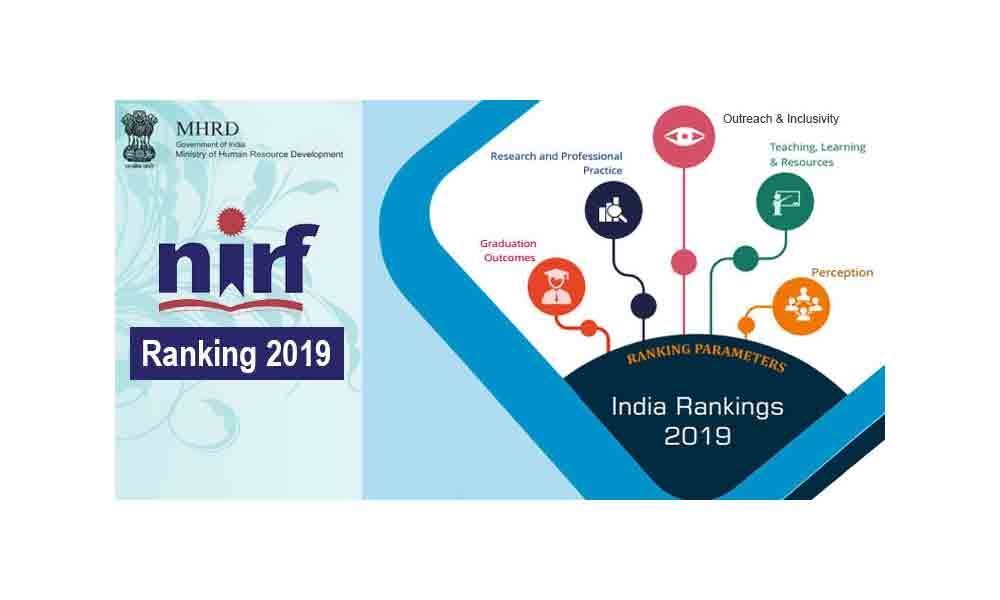Live
- Rich tributes paid to Vajpayee on 100th birth anniversary
- DRM pats Ati Vishisht Rail Seva Puraskar recipient
- MP calls for economic empowerment of women
- Asifabad: Despite huge numbers, Banjaras lagging behind
- Hyderabad: 2 arrested for smuggling; 281 starfish, 160 tortoises seized
- Formula E race: ACB intensifies probe, to focus on KTR’s role
- Muslim students express concern over SSC exam, Ramzan date clash
- ‘Pushpa 2’ team pledges Rs 2 cr to stampede victim’s family
- More remote habitations to get road connectivity
- Fund crunch hitting HYDRA demolitions?
Just In

Academicians meet and brainstorm on NIRF ranking system
New Delhi: Ever since the first ever official domestic ranking of the top universities, engineering colleges and management institutions in the country were released in 2016 by MHRD, it has been drawing criticism from a large section of the academia due to anomaly in the rankings. While NIRF maintained that the rankings were based on the data submitted by varsities, academia raising red flags, pointed out glaring gaps in the process as some of the lesser known and obscure names were found on the top of the categories. To address this and with an objective to brainstorm and collect recommendations from various heads of institutions, a round table conference was held at FORE School of Management, in association with MBA Rendezvous. The conference which was well attended by 15 academicians including heads of top institutes and ranking experts deliberated on the aspects to be looked into by NIRF.
The entire proceedings were recorded with the objective of presenting the same to NIRF as recommendations to be considered as integral part of the methodology being adopted, in order to enhance transparency and credibility. Great deal of deliberations happened on 5 components currently used in NIRF - Teaching, Learning & Resources, Research and Professional Practice, Graduation Outcomes, Outreach and Inclusivity and Perception.
Dr. Jitendra K. Das, Director, FORE School of Management, New Delhi, the convener cum moderator for the round-table, touched up the very objective of the session, requesting speakers for suggestions on improvement areas for positive impact in the NIRF rankings. Talking about Research Dr. Das, mentioned how the current process considers the number of research papers submitted. He asked his fellow academicians whether the number of research papers submitted to publication was important or quality of the paper and of the publication was more important.
Referring to the international accreditations which are widely respected, Dr. Manoj Pant, Director, Indian Institute of Foreign Trade (IIFT) stated that the data collected by NIRF rankings can also be used for a reliable internal accreditation system through which institutions can get enough inputs for development and assessing quality.
The suggestion of having a reliable audit mechanism at NIRF was unanimously lauded by the academicians. Dr. Urvashi Makkar, Director General, GL Bajaj Institute of Management & Research suggested that the rankings should share data and ranks for all institutes instead of just the top ones. Students from all corners and categories aspire for higher education and have the right to acquire knowledge about the institutions they may opt for, similarly for institution, it may be a tool for self-introspection.
"Why should the rank be limited to top 100 schools? What happens to the bottom of the pyramid?" she asked. Dr. Neetika Batra, Associate Dean & Program Chair at SOIL (School of Inspired Leadership) suggested that the ranking process should also include a tangible methodology to assess the quality of education – the social relevance of the 'Knowing-Doing-Being' and larger role the institute plays towards contributing to the societal development. Prof. Vishwanthan S R, Programme Chair at Shiv Nadar School of Management & Entrepreneurship stressed upon the overall development of the management education system and enabling a process which helps business schools achieve global perspectives.
Thothathri Raman, International Accreditation Advisor & Chairman, Standards for Educational Advancement & Accreditation (SEAA) Trust, New Delhi, talked about standardization of the benchmarking system. With several rankings in the country published by business magazines, education portals, there is a huge discrepancy among the set of rankings.
While NIRF is still at an evolving stage, credibility and acceptance need to be worked upon. Dr. Vishal Talwar, Dean, School of Management, BML Munjal University and Dr. Meena Bhatia, Associate Professor, BIMTECH Noida, stressed up on the quality aspect of the research papers and citations while suggesting that NIRF ranking should focus on parameters for making institutes world class.
The collective wisdom in the room agreed with Prof. Puja Aggarwal, Associate Professor, IMT Ghaziabad, when she highlighted the fact that amidst all other rankings which are not much trustworthy and are seen as 'biased' to a great extent, NIRF rankings is perceived as a genuine approach to the students community as there is no business associated, and which is a huge positive. But to take this to a level where students start taking it seriously is something which needs to be worked upon.
Also present were Prof. Swapan Das Gupta, Faculty, New Delhi Institute of Management, Dr. D N Pandey, Director, Jaipuria Institute of Management, Noida, Dr. AK Sinha, Faculty, Fortune Institute of International Business, Mr. A S Oberoi, Founder president MBA Rendezvous. Dr. Das spoke about the Perception Section of the ranking method as he concluded the conference and said, "The methodology in the Perception Section calls for higher level of transparency". A vote of thanks was given by Dr Hitesh Arora, faculty at FORE School of Management, New Delhi.

© 2024 Hyderabad Media House Limited/The Hans India. All rights reserved. Powered by hocalwire.com







